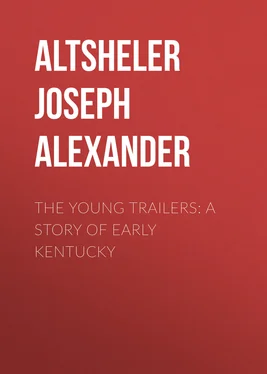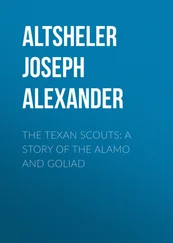Joseph Altsheler - The Young Trailers - A Story of Early Kentucky
Здесь есть возможность читать онлайн «Joseph Altsheler - The Young Trailers - A Story of Early Kentucky» — ознакомительный отрывок электронной книги совершенно бесплатно, а после прочтения отрывка купить полную версию. В некоторых случаях можно слушать аудио, скачать через торрент в формате fb2 и присутствует краткое содержание. Жанр: foreign_children, foreign_antique, foreign_prose, prose_military, на английском языке. Описание произведения, (предисловие) а так же отзывы посетителей доступны на портале библиотеки ЛибКат.
- Название:The Young Trailers: A Story of Early Kentucky
- Автор:
- Жанр:
- Год:неизвестен
- ISBN:нет данных
- Рейтинг книги:3 / 5. Голосов: 1
-
Избранное:Добавить в избранное
- Отзывы:
-
Ваша оценка:
- 60
- 1
- 2
- 3
- 4
- 5
The Young Trailers: A Story of Early Kentucky: краткое содержание, описание и аннотация
Предлагаем к чтению аннотацию, описание, краткое содержание или предисловие (зависит от того, что написал сам автор книги «The Young Trailers: A Story of Early Kentucky»). Если вы не нашли необходимую информацию о книге — напишите в комментариях, мы постараемся отыскать её.
The Young Trailers: A Story of Early Kentucky — читать онлайн ознакомительный отрывок
Ниже представлен текст книги, разбитый по страницам. Система сохранения места последней прочитанной страницы, позволяет с удобством читать онлайн бесплатно книгу «The Young Trailers: A Story of Early Kentucky», без необходимости каждый раз заново искать на чём Вы остановились. Поставьте закладку, и сможете в любой момент перейти на страницу, на которой закончили чтение.
Интервал:
Закладка:
"Pushed by hunger, an' thinking there was no danger, he might have sprung on one of our colts or a calf," said Ross, "an' no doubt the boy with his ready use of a torch has saved us from a loss. It was a brave thing for him to do."
But Henry took no pride in their praise. It was no part of his ambition merely to drive away a panther, instead he had the hunter's wish to kill him. He would be worthy of the wilderness.
Henry despite his lack of pride found the world very beautiful the next day. It was a fair enough scene. Nature had done her part, but his joyous mind gave to it deeper and more vivid colors. The wind was blowing from the south, bringing upon its breath the odor of wild flowers, and all the forest was green with the tender green of young spring. The cotton-tailed hares that he called rabbits ran across their path. Squirrels talked to one another in the tree tops, and defiantly threw the shells of last year's nuts at the passing travelers. Once they saw a stag bending down to drink at a brook, and when the forest king beheld them he raised his head, and merely stared at these strange new invaders of the wilds. Henry admired his beautiful form and splendid antlers nor would he have fired at him had it even been within orders. The deer gazed at them a few moments, and then, turning and tossing his head, sped away through the forest.
All that he saw was strange and grand to Henry, and he loved the wilderness. About noon he and Ross went back to the wagons and that night they encamped on the crest of a range of low and grassy hills. This was the rim of the valley that they had selected on the guide's advice as their future home, and the little camp was full of the liveliest interest in the morrow, because it is a most eventful thing, when you are going to choose a place which you intend shall be your home all the rest of your days. So the men and women sat late around the fires and even boys of Henry's age were allowed to stay up, too, and listen to the plans which all the grown people were making. Theirs had not been a hard journey, only long and tedious—though neither to Henry—and now that its end was at hand, work must be begun. They would have homes to build and a living to get from the ground.
"Why, I could live under the trees; I wouldn't want a house," whispered Henry to the guide, "and when I needed anything to eat, I'd kill game."
"A hunter might do that," replied Ross, "but we're not all hunters an' only a few of us can be. Sometimes the game ain't standin' to be shot at just when you want it, an' as for sleepin' under the trees it's all very fine in summer, if it don't rain, but 'twould be just a least bit chilly in winter when the big snows come as they do sometimes more'n a foot deep. I'm a hunter myself, an' I've slept under trees an' in caves, an' on the sheltered side of hills, but when the weather's cold give me for true comfort a wooden floor an' a board roof. Then I'll bargain to sleep to the king's taste."
But Henry was not wholly convinced. He felt in himself the power to meet and overcome rain or cold or any other kind of weather.
Everybody in the camp, down to the tiniest child, was awake the next morning by the time the first bar of gray in the east betokened the coming day. Henry was fully dressed, and saw the sun rise in a magnificent burst of red and gold over the valley that was to be their valley. The whole camp beheld the spectacle. They had reached the crest of the hill the evening before, too late to get a view and they were full of the keenest curiosity.
It was now summer, but, having been a season of plenteous rains, grass and foliage were of the most vivid and intense green. They were entering one of the richest portions of Kentucky, and the untouched soil was luxuriant with fertility. As a pioneer himself said: "All they had to do was to tickle it with a hoe, and it laughed into a harvest." There was the proof of its strength in the grass and the trees. Never before had the travelers seen oaks and beeches of such girth or elms and hickories of such height. The grass was high and thick and the canebrake was so dense that passage through it seemed impossible. Down the center of the valley, which was but one of many, separated from each other by low easy hills, flowed a little river, cleaving its center like a silver blade.
It was upon this beautiful prospect that the travelers saw the sun rise that morning and all their troubles and labors rolled away. Even the face of Mr. Ware who rarely yielded to enthusiasm kindled at the sight and, lifting his hand, he made with it a circle that described the valley.
"There," he said. "There is our home waiting for us."
"Hurrah!" cried Henry, flinging aloft his cap. "We've come home."
Then the wagon train started again and descended into the valley, which in very truth and fact was to be "home."
CHAPTER II
THE FIRST GREAT EXPLOIT
They found the valley everything in beauty and fertility that Ross had claimed for it, and above all it had small "openings," that is, places where the trees did not grow. This was very important to the travelers, as the labor of cutting down the forest was immense, and even Henry knew that they could not live wholly in the woods, as both children and crops must have sunshine to make them grow. The widest of these open spaces about a half mile from the river, they selected as the site of their new city to which they gave the name of Wareville in honor of their leader. A fine brook flowed directly through the opening, but Ross said it would be a good place, too, to sink a well.
It was midsummer now and the period of dry weather had begun. So the travelers were very comfortable in their wagon camp while they were making their new town ready to be lived in. Both for the sake of company and prudence they built the houses in a close cluster. First the men, and most of them were what would now be called jacks-of-all-trades, felled trees, six or eight inches in diameter, and cut them into logs, some of which were split down the center, making what are called puncheons; others were only nicked at the ends, being left in the rough, that is, with the bark on.
The round logs made the walls of their houses. First, the place where the house was to be built was chosen. Next the turf was cut off and the ground smoothed away. Then they "raised" the logs, the nicked ends fitting together at the corner, the whole inclosing a square. Everybody helped "raise" each house in turn, the men singing "hip-hip-ho!" as they rolled the heavy logs into position.
A place was cut out for a window and fastened with a shutter and a larger space was provided in the same manner for a door. They made the floor out of the puncheons, turned with the smooth side upward, and the roof out of rough boards, sawed from the trees. The chimney was built of earth and stones, and a great flat stone served as the fireplace. Some of the houses were large enough to have two rooms, one for the grown folks and one for the children, and Mr. Ware's also had a little lean-to or shed which served as a kitchen.
It seemed at first to Henry, rejoicing then in the warm, sunny weather, that they were building in a needlessly heavy and solid fashion. But when he thought over it a while he remembered what Ross said about the winters and deep snows of this new land. Indeed the winters in Kentucky are often very cold and sometimes for certain periods are quite as cold as those of New York or New England.
When the little town was finished at last it looked both picturesque and comfortable, a group of about thirty log houses, covering perhaps an acre of ground. But the building labors of the pioneers did not stop here. Around all these houses they put a triple palisade, that is three rows of stout, sharpened stakes, driven deep into the ground and rising full six feet above it. At intervals in this palisade were circular holes large enough to admit the muzzle of a rifle.
Читать дальшеИнтервал:
Закладка:
Похожие книги на «The Young Trailers: A Story of Early Kentucky»
Представляем Вашему вниманию похожие книги на «The Young Trailers: A Story of Early Kentucky» списком для выбора. Мы отобрали схожую по названию и смыслу литературу в надежде предоставить читателям больше вариантов отыскать новые, интересные, ещё непрочитанные произведения.
Обсуждение, отзывы о книге «The Young Trailers: A Story of Early Kentucky» и просто собственные мнения читателей. Оставьте ваши комментарии, напишите, что Вы думаете о произведении, его смысле или главных героях. Укажите что конкретно понравилось, а что нет, и почему Вы так считаете.












